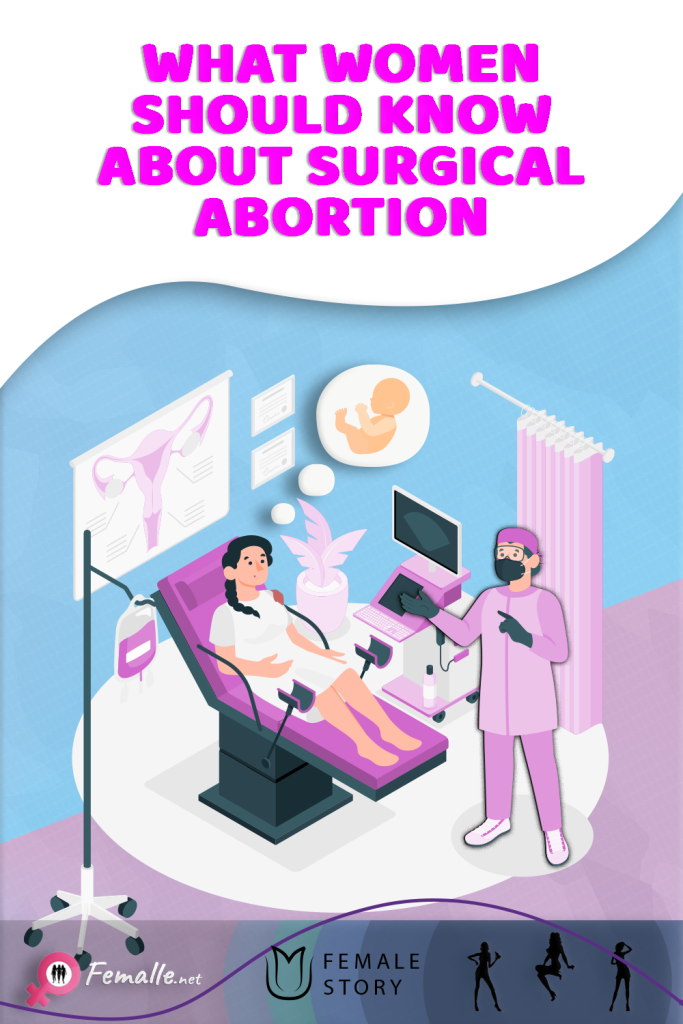What Women Should Know About Surgical Abortion
A surgical abortion is a procedure that terminates a pregnancy, which is typically performed up to 14-16 weeks after the pregnant woman’s last period. A doctor or advanced practice nurse usually performs the procedure in an out-patient office or clinic, or hospital.
What to Expect During a Surgical Abortion
Surgical abortion, also known as suction aspiration, is a medical procedure that removes the pregnancy tissue from the uterus. Here’s what you can expect during a surgical abortion:
First, you’ll receive relaxation and pain medication to help you feel more comfortable during the procedure. The doctor will also numb your cervix to minimize any discomfort.

Next, the doctor will insert a thin tube through your cervix and into your uterus. The tube is attached to a vacuum that gently removes the pregnancy tissue. In some cases, the doctor may also use a medical instrument called a “curette” to remove any remaining tissue.
The entire procedure usually takes between 10 and 20 minutes, and you’ll be able to go home shortly after it’s completed. However, it’s important to rest and take it easy for the rest of the day.
After the procedure, your doctor will likely prescribe antibiotics to prevent infection. They’ll also give you instructions on what to watch out for and when to call if you experience heavy vaginal bleeding, abdominal pain or tenderness, unusual discharge or odor, or a fever of 101°F or higher.
It’s normal to experience cramping and light bleeding for a few days after the procedure. Your doctor will provide you with information on how to manage any discomfort and what to expect during your recovery.
Is Surgical Abortion Safe?
Surgical abortion is a safe and routine procedure when performed by a medical doctor or clinical nurse specialist in a regulated and properly equipped facility. Here’s what you should know about the safety of surgical abortion:
Before abortion was legalized in the US, illegal abortions were often performed in unsanitary conditions, which increased the risk of complications and infection. Today, abortions are performed in safe, clean offices with a staff of medical professionals who provide counseling and after-care.
Although complications with a routine abortion are rare, it’s important to be aware of the possible risks involved. These may include excessive bleeding, infection of the uterus or fallopian tubes, and damage to the womb or cervix.
However, it’s important to note that the risks of complications from a surgical abortion are relatively low. In fact, the risk of serious complications is lower for an abortion than for childbirth. Additionally, the medical team performing the procedure will take steps to minimize the risk of complications and ensure your safety.
Some young women may be concerned about going to a clinic or office for an abortion due to reports of picketers or threats of violence by people who don’t believe in abortion. However, most clinics have a strong security presence and patients can ask for an escort if necessary. It’s important to prioritize your safety and seek care from a reputable and regulated facility.
After Abortion Symptoms – What to Expect
After an abortion, it’s common to experience some physical and emotional symptoms. Here are some things you may experience and how to manage them:
-
Physical Symptoms: You may experience some cramping, bleeding, and spotting for a few days after the abortion. This is normal and is a sign that your body is healing. Your healthcare provider will provide you with instructions on how to manage these symptoms, which may include using pads instead of tampons, avoiding sexual activity for a few weeks, and taking pain medication as needed.
-
Emotional Symptoms: Many people experience a range of emotions after an abortion, including sadness, guilt, and relief. It’s important to allow yourself time to process these emotions and seek support from loved ones, a therapist, or a support group if needed.
-
Complications: While complications from abortion are rare, it’s important to be aware of the signs of a potential problem. Contact your healthcare provider if you experience heavy bleeding, severe pain, fever, chills, or foul-smelling discharge.
-
Follow Up Care: It’s important to attend any follow-up appointments with your healthcare provider to ensure that your body is healing properly and to address any questions or concerns you may have. Your provider may also discuss birth control options with you to help prevent future unintended pregnancies.
Remember that everyone’s experience after an abortion is different, and it’s important to prioritize your physical and emotional well-being during this time. Be kind to yourself and seek support if needed.
How Long does the Pain last After an Abortion ?
The length and severity of pain after an abortion can vary from person to person, as well as depending on the type of abortion procedure. Some people may experience mild cramping for a few hours, while others may have more significant pain that lasts for a few days.
It’s common to experience cramping and discomfort after an abortion, but this can typically be managed with pain medication and rest. Your healthcare provider will provide you with specific instructions on how to manage pain after your abortion.
Tips:
Making the decision to end a pregnancy can be complex and emotionally challenging. It’s important to take the time to fully understand all of your options and the potential risks and benefits involved before making a decision.
One way to navigate this decision-making process is to talk with someone you trust, such as a close friend, family member, or healthcare provider. They can provide support, guidance, and valuable information about the available options.
In addition to speaking with trusted individuals, it’s important to do your own research and gather information from reputable sources. This may include reading about different types of abortion procedures, the potential risks and benefits, and the laws and regulations in your area.
Remember that the decision to end a pregnancy is ultimately yours, and you have the right to make the choice that feels best for you. Take the time to consider all of your options, understand the risks and benefits, and seek support from those you trust.
Originally posted 2018-07-28 15:46:04.


